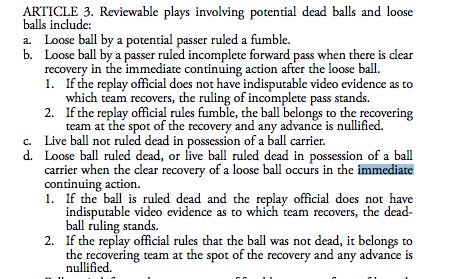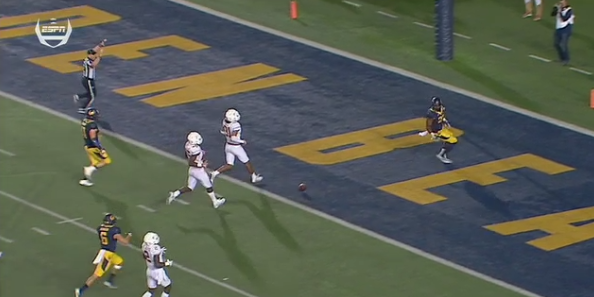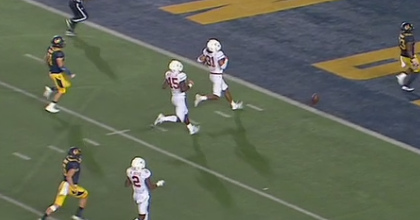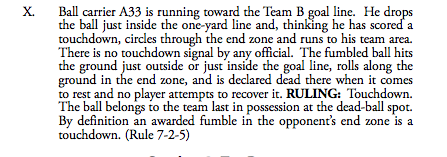Cal vs Texas had a bit of a strange ending and replay review, which I’m sure everyone has seen by now. Many didn’t quite understand what happened; many think that Texas should have been given the ball. Let’s break down exactly what call was made and see if it was right.
First of all, let’s take a look at the play.
It looks like a clear touchdown by Cal live, which would in effect seal the game (more on that later). The replay booth noticed that Vic Enwere had dropped the ball early, meaning that he fumbled it. As you can see in the video, the replay booth ruled that it was indeed a fumble, but since there was no immediate recovery Cal would retain possession on the Texas 1-yard line.
Many saw this and were shocked. They could recall other plays that didn’t have the same outcome. Also, as the commentators noted, a Texas player picked up the ball. So how could the replay officials not give Texas possession?
“no immediate recovery” THIS TEXAS GUY LITERALLY HAS THE BALL pic.twitter.com/56sMyWARrE
— Timothy Burke (@bubbaprog) September 18, 2016
Let’s take a look at the relevant rules. First of all, is replay allowed to reward Texas with the ball? Yes, but only under specific circumstances. The following (Rule 12-3-3-b) establishes that the replay official can overturn a call in a case of a “live ball ruled dead in possession of a ball carrier when the clear recovery of a loose ball occurs in the immediate continuing action.”

In short, it means that if a ball was declared dead while it was technically still live, the replay official can change possession if there is an immediate recovery. That’s what happened in our case. The ball was still live (because it had been fumbled), but it was ruled dead (when the referee signaled touchdown). Therefore, if there was an immediate recovery, Texas could be awarded the ball.
Now, the immediate recovery rule makes perfect sense. We can’t just imagine “what if” and pretend that a whistle hasn’t blown. If a whistle blows early, there’s no way to change that. Players stop. Players change their actions. We can’t just pretend that the whistle hadn’t blown. It might lead to unfortunate outcomes, but there is no other way to do it.
On the video above, you can’t hear a whistle because it is so loud. However, in the replay section, you can clearly see the referee (at 1:21) signal touchdown.

A touchdown signal means that the referee blew his whistle and declared the play dead. So was there a recovery in the immediate aftermath? There clearly wasn’t. It took a Texas player about three seconds to pick up the ball. Three seconds seems pretty immediate, but it really isn’t. You can clearly see at least two Cal players run past the ball before a Texas player picks it up.

Again, we can’t play a “what if” game. There’s a reason that the word “immediate” is ambiguous and subjective. In this case, the situation proves that it wasn’t “immediate.” Were those Cal players probably going to run past the ball? Sure. But we can’t prove that and we can’t guess. So, by definition, Texas’ recovery was not immediate. Had there been no Cal players near the ball with a chance to recover, then three seconds might qualify as “immediate.” Since that wasn’t what happened, though, we can’t just assume that those Cal players probably wouldn’t have dove after the ball had no signal been given. The referees made the right call in not awarding a fumble recovery to Texas.
However, it was not clear to some why Cal was awarded the ball on the Texas 1-yard line. This rule (Approved Ruling 8-2-1-X) seems to imply that the correct ruling should have been a Cal touchdown.

The play is not precisely as worded in the approved ruling case, but the basic detail is the same. The ball was declared dead in the defending team’s end zone. Therefore, it should be a touchdown.
The reason the rule in question never came into play is because of the wording of the replay rule quoted above. It is not that the Cal fumble became a fumble with no recovery. If there is no recovery, the replay booth does not have a right to call the play a fumble, even if that’s what it should have been. So the replay booth determines that it was dropped at the one-yard line, which is where the play now ends. It is not technically a fumble, because the replay official cannot call an unrecovered fumble. Instead, Cal gets the ball at its last moment of possession, which was the one-yard line.
Ironically enough, a touchdown would probably have been better off for Texas. Because Cal got the ball back, the Golden Bears could just kneel out the clock and end the game. Everyone points out that the solution to this seeming epidemic of players dropping the ball before crossing the end zone is for players to just carry the ball to the referee. But Cal had a much better solution to this issue. Enwere should have just slid down after getting the first down. Sure, it’s not as flashy as another score. But scoring gives Texas the ball with a chance to score and kick the ball onside. Sliding down guarantees a win because Cal could take knees. Players should have the game awareness to slide down to cement wins. That would also remove potential issues like fumbling, in addition to the more obvious case of the opponent scoring in response.
